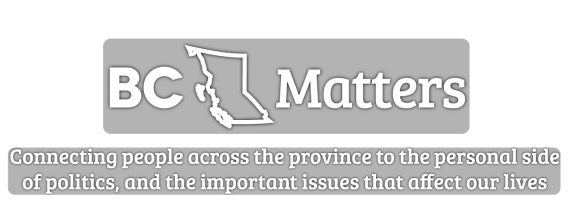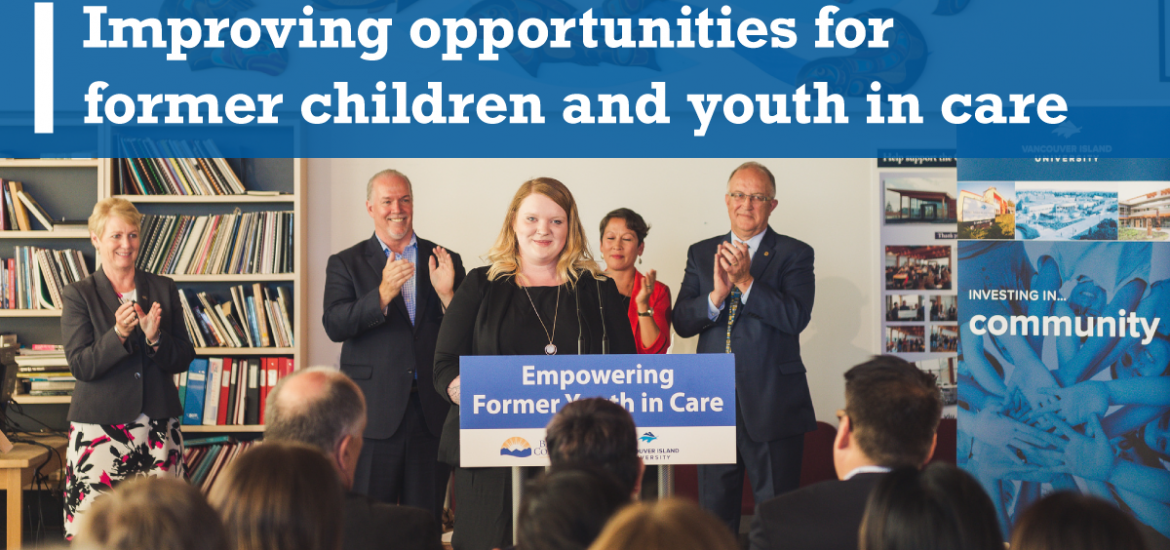
This month, young people across B.C. went back to college and university for the spring semester. It’s an exciting time as young adults see new experiences and new opportunities. I’m sure we can all remember thinking about all the things we could be when we grew up. Our families would nurture and support our curiosities and passions hoping that we were always reaching our potential. Such was not always the case for many young people who were living in government care, apart from their family and with fewer support networks.
Today, about 7,500 children and youth are in the care of the Province or on youth agreements. In these cases, the Province often acts in the place of a guardian for many young people. As a responsible “parent”, it is government’s responsibility to see to it that all these children are afforded enhanced opportunities to succeed in life, because young people who were in care should have opportunities to thrive, not just survive.
The previous B.C. Liberal government was making some bad parenting choices for a long time. Young people saw 16 years of cuts and under-funding, which included clawbacks to bursaries provided by colleges and universities to current and former youth in care. Instead of looking for ways to create better opportunities for young people, government’s priorities were with their friends. Vulnerable youth did not fare well under the B.C. Liberals’ watch.
Many young people who are in care need to be given the chance to establish the extended support networks that would support them in their educational pursuits. Fewer than half of kids in care graduate high school before the age of 19.[1]
From my personal experience working with young people who may have had a few stumbling blocks put in their way in life, seeing them reach their full potential and become happy citizens is rewarding. They may not all want to continue in post-secondary education right away, but having the option and the opportunity is important.
Last summer, we finally got a new government that puts people first, and some of those people include former youth in care, who will be getting the support they need to continue their studies. On September 1, 2017, Premier John Horgan announced the expansion of the tuition waiver program for former youth in care to all 25 public post-secondary institutions in British Columbia. Before this historic announcement, there was no provincial standard with 11 public post-secondary institutions offering a variety of programs, each with different criteria. However, the new changes have delivered amazing results.
By the end of November 2018, 687 former youth in care benefited from the provincial tuition waiver program, a drastic increase compared to the 2016-2017 academic year. The Province paid out $2.6 million in tuition and fees to 24 public post-secondary institutions, the top three being Vancouver Island University, Camosun College, and Thompson Rivers University. These young people have been given improved opportunities to learn and strengthen their chances to achieve their goals.
In order to ensure young people who age out of care get the support they need to thrive, the Ministry of Children and Family Development has made enhancements to the Agreements with Young Adults (AYA) program, which helps young adults successfully transition to adulthood, which includes attending college or university. In the 2018/19 year of the AYA program, our government has added an extra year of eligibility, increased the maximum monthly support rate by $250, and made supports available for a full calendar year instead of the previous eight months, so students wouldn’t have to couch surf during summer months.
This past summer, we have also announced the expansion of the program to former youth in care students who are either taking a foundation program or apprenticeship training at 10 union-based training providers. This ensures that no matter what field former youth in care want to choose, they have the support in place to succeed.
A good guardian encourages success in youth by encouraging them to pursue their goals and embrace the opportunities that lie ahead. I am very pleased that our new New Democrat government is doing this, and improving its system of care.
Improving access to post-secondary education and trades programs is not only beneficial to young British Columbians who are graduating high school, but it is good for our entire province because when a young person succeeds, we all benefit.
While our government has done a lot of amazing work to remedy years of neglect or misplaced priorities, there is a lot of work still to do. We will continue to find ways of making life, from childcare to tuition and beyond, more affordable. I look forward to seeing what we can do together to put people in British Columbia back in the centre of government’s priorities.
—–
[1] Fisher, Gavin. “Fewer than Half of B.C. Kids in Foster Care Graduate High School before 19, Report Says.” CBC , CBC, 23 June 2016, www.cbc.ca/news/canada/british-columbia/fewer-than-half-of-b-c-kids-in-foster-care-graduate-high-school-before-19-report-says-1.3648384.

